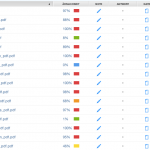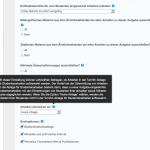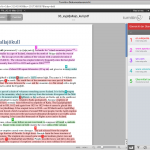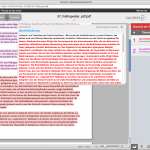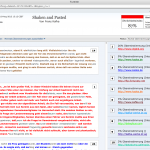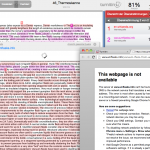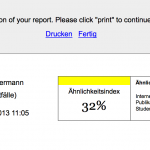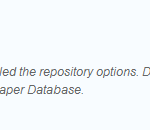Software Profile | Description | Pros & Cons | Report | Usability | Summary | Screenshots | Company Statement
Software Profile
| ID | S13-03 |
| Product | Turnitin |
| Company | iParadigms, LLC, 1111 Broadway, #3, Oakland, CA 94607, USA International Office: iParadigms Europe Ltd., 6-8 Charlotte Square, Newcastle, NE1 4XF, UK |
| Web-Site | http://www.turnitin.com |
| Software-Type | Online, can be integrated into Blackboard and Moodle |
| Pricing | There are different license models, a campus License or a departmental license. The costs depend on the number of students. For more information the company has to be contacted. |
| Testdate | 21 March 2013 |
Description
Turnitin is a plagiarism detection software from the American company iParadigms, located in San Francisco. The company was founded in 1996 by a group of students from the University of California, Berkeley, it currently employs over 150 persons world-wide and is one of the largest companies. The Turnitin system is not free, the costs are not given on the web site, as they are negotiated individually with each institution.
Pros & Cons
Results are rapid for small texts, making it useful for smallish term papers. The system is easy to use despite the daunting array of menus and parameters. Turnitin was able to find the correct source for the Hebrew test case, as it was able to deal with Japanese characters in the 2010 test. As one of only two systems in the test, it was able to deal with homoglyphs.
Since the company offers modules that connect a school account with popular learning management systems, it is easily integrated into the submission process. It is also possible to offer the use of Turnitin in a formative manner, permitting the students to submit their papers to Turnitin and receive feedback, enabling them to fix their papers before handing them in to their instructors
The system was much less effective with large files, taking hours to complete the report and then even missing plagiarisms that were easily found in the smaller test cases. The terms of use are also quite problematic, as the company is given the right to store and use the papers. There are ways to stop Turnitin from storing the papers, but they are hidden and not well named. It should be crystal clear on any overview which papers are stored and which are not. The name for the function for storing papers, „Studentenarbeitsablage verwenden“, is completely misleading. The German version of the system still suffers from strange terms („Echtheitsbericht“ or „Aufgabeneingang“) that are not clear to German users.
Often, the system will give preference to copies of the Wikipedia and not to the Wikipedia itself as the source for a portion of text. Some of these copies are used to sell erotic material that might not be good to be viewed on government computers.
The most maddening problem is the excessive amount of pages that flag plagiarism, but are no longer available on the web at the address given. That makes the use of the system quite frustrating, as plagiarism can be seen, but not properly documented.
One specific test was made to see if Turnitin can identify sources that are in journals that have been stored with CrossCheck, another product of the company that serves scientific journals. Indeed, it was able to find the source, as advertised.
Report
Only the old version of the report has a sort of side-by-side version, and that is only available online. The printed version of the report does not have this option, as far as we could see. The newer online interface has „flying windows“ that are problematic in their use, as they slide under each other. The text copied appears in this flying window, making it very difficult to copy it for a written report. This is the major criticism, as the written reports are not useful for German examination boards that want clear documentation of the plagiarism without having to consult external sources.
Usability
The usability of the system was found to be good, despite the missing printed side-by-side report and the strange terms in German.
Summary
Turnitin is a system that is well suited to quickly finding indications plagiarism in smallish texts and can handle non-Latin character sets. However, it does not find all such plagiarism. The largest problem is that Turnitin stores the papers on US servers, if the user does not manage to find and turn off this function. Universities must be clear as to whether the non-disclosure agreements that they may have agreed to permits the theses to be uploaded to the companies servers. They would also be advised to obtain the explicit permission from the students for using their papers in this manner.
Screenshots
- Link to erotic content displayed as source by Turntin
- Overview of results and documents in Turnitin
- Hidden option to choose if uploaded document shall be stored in Turnitin’s database.
- Although the text is completely taken from the Wikipedia, other sources are also given by Turnitin.
- Wikipedia found as source for Fallingwater by Turnitin
- Turnitin finds homoglyphs
- Webpage not available while testing Turnitin
- German and English mixed up on one page in Turnitin
- Excluding citations in Turnitin
Company Statement
Turnitin has the following statement about the test 2013:
Turnitin takes the issue of storage and deletion of customer papers very seriously and has extensive discussions with each customer regarding this. As a result of feedback specifically from German customers, last year we created an option for universities to turn off the paper repository option for all users, so that no material can be saved in the database. Please see screenshot below. We also spent a considerable period of time rewording parts of our user agreements to make clear who retains the right to the papers, which is the student and institution.


